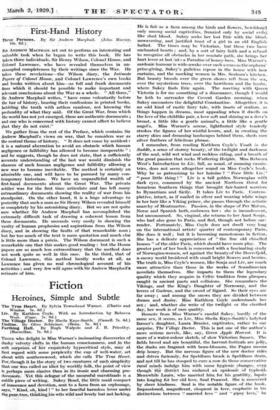First-Hand History
Three Persons. By Sir Andrew Macphail. (John Murray. 10s. 6d.)
• Sat ANDREW MACPHAIL set out to perform an interesting and valuable task when he began to write this book. He has taken three individuals, Sir Henry Wilson, Colonel HOuse, and Colonel Lawrence, who have revealed themselves in un- exampled completeness by their writings since the War. He takes these revelations—the Wilson diary, the Intimate Papers of Colonel House, and Colonel Lawrence's own books and books written about him—as full and frank documents from which it should be possible to make important and relevant conclusions about the War as a whole. " All three," Sir Andrew Macphail writes, " have come voluntarily before the bar of history, bearing their confessions in printed books, babbling the truth with artless candour, not knowing the profundity of what they said. Of the Great War, from which the world has not yet emerged, these are authentic documents ; and one who is concerned with history cannot affect to believe that they do not exist."
We gather from the rest of the Preface, which contains Sir Andrew Maephail's views on war, that he considers war as the central theme of history. " It does not come by accident : it is a natural aberration to avoid an obstacle which human negligence or fallibility has allowed to become insuperable " : and he suggests, though he does not state, that a sufficiently accurate understanding of the last war would diminish the chances of such human negligence and fallibility allowing a new war to become inevitable. The method is certainly an admirable one, and will have to be pursued by many con- temporary historians. We have an unparalleled wealth of first-hand documents about the Great War. The private soldier was for the first time articulate and has left many extraordinary documents showing the reality of war from his standpoint. On the other- hand, it is a huge advantage to posterity that such a man as Sir Henry Wilson revealed himself so completely by his astonishing diary. But we are not quite sure whether Sir Andrew Macphail has accomplished the extremely difficult task of drawing a coherent lesson from these documents. He succeeds very easily in showing the vanity of human prophesies and aspirations from the Wilson diary, and in showing the faults of that remarkable man ; but far too much of the text is mere quotation and much else is little more than a precis. The Wilson document is such a remarkable one that this makes good reading : but the House papers are so much less extraordinary that the method does not work quite so well hi this case. In the third, that of Colonel Lawrence, this method hardly works at all, as Lawrence has given no real chronological account of his activities ; and very few will agree with Sir Andrew Afacphairs estimate of him.
. • .
























































 Previous page
Previous page